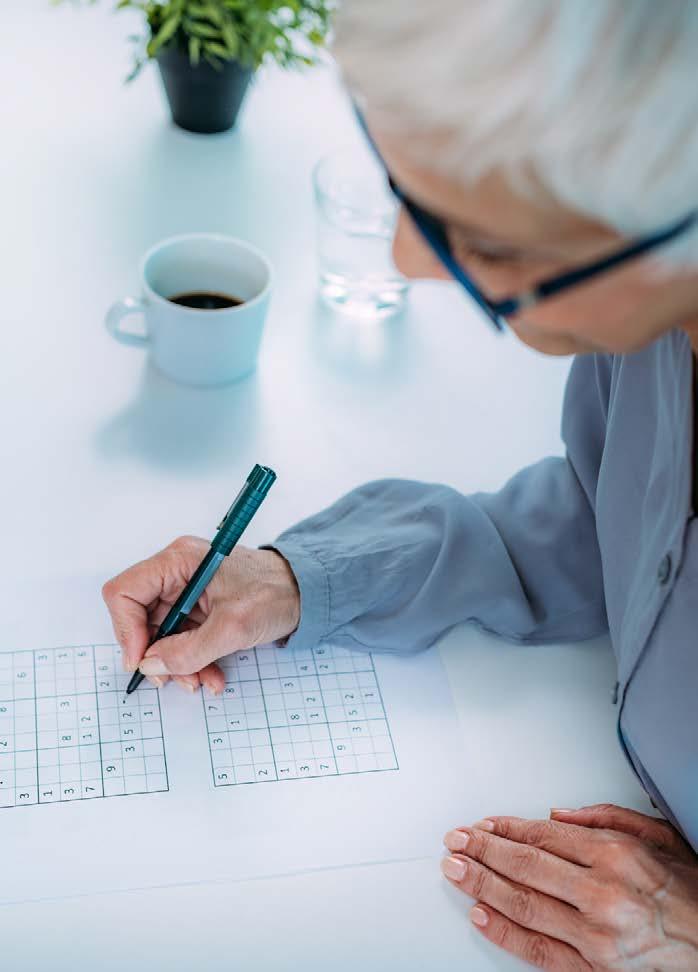
3 minute read
Tips for a happy brain
HEALTH & WELLBEING
The brain has four natural chemicals that work together to regulate mood, perception and our view on life. Finding ways to boost these chemicals can regulate our thoughts, feelings and emotions, like satisfaction and happiness.
Advertisement
Known as neurotransmitters, the following chemicals are produced in the hypothalamus which is a small region of the brain: DOPAMINE - this helps you feel pleasure. The brain releases dopamine when you do things that feel good or pleasurable or when you complete a task. It’s an important part in your reward system. Dopamine also helps with movement and motivation. SEROTONIN - this is produced when you feel satisfaction or importance. It also helps regulate your sleep, appetite and mood. Many anti-depressant medications are selective serotonin reuptake inhibitors that help boost levels of serotonin. OXYTOCIN - produces feelings of love and connection. Also known as the cuddle hormone, the brain may produce oxytocin during sex or maternal behaviour such as childbirth or breastfeeding. ENDORPHINS - trigger positive feelings when you do something you enjoy such as laughing or exercising. They also stimulate pain relief, which is the same reaction that occurs chemically when taking prescription opioids. The euphoric feeling endorphins produce helps mask pain. To increase these chemicals in your brain you can try: • eating well • exercising • laughing • meditating • completing simple tasks or a goal you can easily achieve • giving someone a compliment • being kind
7 TIPS FOR BETTER MENTAL HEALTH
Just like physical fitness, mental fitness requires regular effort. Benefits of looking after your mental health include:
• Flexible thinking and problem-solving • Managing everyday stress • Feeling connected to others • Resilience when things go wrong.
1. Get into life
Do things that are enjoyable and provide a sense of purpose. Get involved in activities on your own terms to boost your confidence and provide opportunities to connect with others. Get involved in activities to boost your confidence and connect with others.
2. Learn new skills for tough times
“When we are no longer able to change a situation,
we are challenged to change ourselves.” - Victor Frankl Think and talk about how to handle tough times for now and in the future. Different strategies work for different people. • Do art, music or journaling - Express thoughts and feelings. • Practice mindfulness - Be in the here and now. • Spend time in nature - Experience sunlight, fresh air and connection. • Set small goals - And see them through. • Talk kindly to yourself - Treat yourself like a loved one. • Talk with others - A problem shared is a problem halved.
3. Create and maintain connections
Connecting with friends, family (including pets) and others in the community, is essential to mental health and wellbeing. We are hardwired to connect with others, it is good for us. Loneliness is a health hazard. Seek out a community centre for ideas and opportunities to join activities, groups and networks.
6. Eat well and drink water
Eating well fuels the body and energy levels and can improve a person’s mood, general health and wellbeing. Seek out whole foods and change your variety frequently. Community hubs have meals available. Good hydration supports clear thinking and concentration. Consuming water also provides benefits for your physical health.

7. Seek help
Stress can provoke other health issues. Seek help when you need it.
Where can I find support?
4. Get enough sleep
Sleep is vital for your mental health. Develop a routine of regular winding down activities before bed and also in the morning. A bedroom that is free of TV, devices and lights may help sleep to come more easily.
5. Stay active
Staying active is critical to physical health, mental agility and mood regulation. Some suggestions include: • Dancing • Yoga • Cycling • Swimming • Gym workouts • Aerobics • Tai chi • Snooker • Walking • Older Persons COVID-19 Support Line Call 1800 171 866 for information and support for senior Australians, their families and carers. Monday to Friday, except public holidays, from 8.30am to 6pm. • FriendLine For anyone who needs to reconnect or just wants a yarn, call (08) 7078 6229. Available 7 days a week from 10am to 8pm.
Remember
Research has shown there is no significant relationship between how much money a person makes and how happy they are.








